|
“The Heavens are telling the Glory of God. The Firmament displays the wonders of his works.” -Psalm 19:1.
Joseph Haydn’s setting of Psalm 19:1 to music in No. 13 of his oratorio Die Schöpfung (The Creation), proclaims that Creation reveals the Creator. I have found this to be true throughout my life, and I often find that hiking and enjoying the world which God has created for us is the best way for me to encounter God. I have twice had the opportunity to go on a 10 day backpacking trek in the Sangre De Cristo Mountains of northern New Mexico; where the Boy Scouts own 140,000 acres of wilderness called Philmont. Before you are allowed in the “backcountry” you must learn how to leave minimal impact in order to preserve the wilderness for others, principles called Leave No Trace. The ideal of these principles are to “take nothing but pictures and leave nothing but footprints.” Because others have been good stewards of the beautiful country God created, I have had the opportunity to enjoy the views and encounter Christ myself through the beauty of his creation. For me, this encounter came from summiting some of the highest peaks in New Mexico and beholding the wonders of his works. Each hiker at Philmont performs a conservation service project during his trek in order to preserve the ranch for future generations. This is the spirit that Pope Francis evokes in his encyclical Laudato Si’ and in today’s first annual World Day of Prayer for the Care of Creation on September 1st. We are stewards of the earth and must do our part to ensure that the world is preserved for future generations of God’s children. This day of prayer is exciting on many fronts, both from our stewardship of creation and the unity of our Christian family. Today is a day to pray for a culture that cares for every living thing from the unborn child, to the elderly, to the trees and rivers, birds and bees. As St. Vincent Pallotti foresaw, living in a shared world requires perseverance, sharing of resources and a spirit of service. We will all need these virtues to develop an authentic human ecology and build up Christ’s Kingdom on Earth. Nick Wagman is Information Technology Coordinator for the Catholic Apostolate Center.
0 Comments
Let’s face it, trudging along in our daily lives can be dull sometimes. One must try, even if the thought is just a curious leap of the soul, to remove oneself from the business of the world and to look up at the sky. We must look up in the sky toward a marvelous sight, the light that propels life on this earth, the face of the creation, and the Creator of beauty.
In all areas of darkness, light abounds brighter than ever. In all things, we exist and share in our lives with our Creator. Everything we do is profound in its own small way. Everything that happens, happens with and for a purpose, with and for a cause, ever meaningful and ever present in our lives. Our lives are living, never truly dying. We will always have the light to look toward. The hope that always lets us know we are never truly alone in anything we do. We must rise into the light in this very moment. This is what the fires of Pentecost are about. We must remember to put action into the journey of the disciple in sharing the truth and love of God in the world. It is waiting for the passions of our own lives to pass and form into one focus of love, pure and true. We are waiting for love, preparing for love, being there for love, attending to love, sacrificing for love, yet we must always remember that we ARE Love. We, as beautiful reflections of the heart of God can illuminate the darkness not only in our own lives, but in others as well. We can be beacons of light, shining bright for others to see. Light is what draws us to the Heavens on a day with a clear sky. It is what makes us wonder at the millions of stars bursting in radiance in the night. It is what can illuminate any darkness no matter how small the flame may be. The light we see in the Sacraments passing from Christ into His people is nothing short of a miracle. The light we witness on the Cross, expelling all sin and darkness from our twisted up hearts, brings us closer to the very nature of love, the deepest kind of love, the love of Christ. In Him I see my guiding Light and my strength to carry on each and every day of my life. He is my starlight in the dark of the sky, letting me gaze of his majesty. In everything, there is light. It is truly present infinitely in our universe. There is a place for us in the skies with the Father, for we, in this world, will rise a stronger people, ready to take up the mission of light, the mission of love, and the mission of hope for all who are searching for something, anything that can fulfill a restless heart. William Clemens is an Undergraduate Student of Theology & Religious Studies at The Catholic University of America in Washington, D.C. Be sure to check out Pope Francis' latest encyclical, Laudauto Si, and visit the Catholic Apostolate Center's Laudato Si Resource Page! The call to holiness and the mission presented to the Church from Jesus Christ is certainly a challenging one. The fact that God created us with the ability to freely choose not only between right and wrong but between varied truths allows the members of Christ’s body, the Church, to live out the freedom given by God by our birth and baptism. The Catechism defines freedom as “the power, rooted in reason and will, to act or not to act, to do this or that, and so to perform deliberate actions on one's own responsibility ... Human freedom is a force for growth and maturity in truth and goodness; it attains its perfection when directed toward God, our beatitude” (1731). The ‘mission,’ so to speak, of Catholics in this day and age is to live the Gospel message and to promote a New Evangelization.
This does not mean that everyone is called to any particular vocation. However, everyone is called to a vocation. It is up to the individual, because of their freedom, to choose and discern where they are being called by God and for what purpose. Thomas Merton, in his book New Seeds of Contemplation, eloquently puts it: Our vocation is not simply to be, but to work together with God in the creation of our own life, our own identity, our own destiny. We are free beings and sons of God. This means to say that we should not passively exist, but actively participate in His creative freedom, in our own lives, and in the lives of others, by choosing the truth. To put it better, we are even called to share with God the work of creating the truth of our identity. Concrete personal reflection has never come easy for me, and there is a reason that people tend to hide their emotions. Reflecting on the meaning of vocation and what God is calling me to do conjures up memories of high school retreats of discovering where God is found in daily life. While structured experiences of faith exploration and formation are important in shaping the broad spectrum of faith, I have learned that is not all of what my faith encompasses. At the very first meeting with my spiritual director, he asked, “Who is Alex?” I began to spew answers such as student, friend, brother, and the like. What I wanted to avoid was the internal reflection on the self because I didn’t want to have to address the underlying feelings regarding vocation and personal identity. If we are indeed called to shape our own identity, then we very often have a choice. This could be a choice between choosing the truth over a falsehood or even between particular vocations. In discernment, it is my task to look forward, to look to the future. If I dwell on the things of the past, I will never adequately be able to say that I have done what God is calling me to do, whatever it may be. It is the Christian’s responsibility, my responsibility, to discern this vocation, whatever it may be, under the guidance of the Holy Spirit. If we must seek the Creator “spontaneously,” as the Vatican II document Gaudium et Spes puts it, on their own accord and out of impulse, then it becomes clear that the mission of the baptized Christian is to seek God always and in all things. The Italian priest Saint Vincent Pallotti, patron of the Catholic Apostolate Center, wrote, “Seek God and you will find God. Seek God in all things, and you will find God in all things. Seek God always and you will always find God.” I have often found consolation in this prayer of Saint Vincent. It serves as a reminder to attune my heart and mind to God, in all things and at all times. Out of this freedom of choice and seeking comes a responsibility to act out of instinct and to lead others closer to Jesus Christ by first seeking the very God who created us. Alex R. Boucher is a collaborator with the Catholic Apostolate Center. Follow Alex on Twitter at @AlexBoucher. To learn more about vocations, please see our Vocational Discernment Resource Page! Editor's Note: This post was originally published on January 15, 2012 Today we celebrate the Solemnity of the Blessed Virgin Mary, Mother of God. As I thought about the many lessons we can learn from our Blessed Mother, I found myself particularly drawn to wondering what it means to be a woman of faith. I’m sure there are many others who have pondered this same idea. Sometimes, I think about how the 21st century seems to illuminate women through a lens of conformity, threatening our truest femininity with negative connotation and making it seem “okay” to expect less of ourselves and of others. Many young women are faced with the struggles of understanding themselves according to how others perceive them, never knowing how to love themselves for who they really are.
Women are faced with the struggles of figuring out what it means to be a woman. We are told in different ways all around us that we are not smart enough or too intimidating, that we are not thin enough or too fat, to flaunt ourselves is to respect ourselves, in order to “get a man” we need to do x, y, and z. I offer a different perspective: womanhood is beautiful and blessed thing that proves we are the crown of creation by God the Father. My role as a Catholic woman is to support and love those around me with unfailing resilience and without ceasing. In the Catholic Church, there is one woman who rose above all difficulties and strife because she said, “Yes.” Mary the Mother of God is a perfect model of holiness and willful obedience to God, and a shining example to womanhood. When betrothed to a man she loved, she faced persecution and rejection from those around her. She knew others would judge her and they would criticize her, but she held true to her “Yes” and bore the Son of God. In our lives, what do we do when others look at us with disgust or with judgments? Can we not choose the higher road and be the person God wants us to be, regardless of what others may think of us? Mary certainly did. It is hard to swim opposite the current at times. Standing up for our virtue is something that most women find difficult or have never heard of before. As a woman of faith, I know that my responsibility to God and to myself is to love Him and love myself. God knows my most intimate thoughts and feelings and he will never leave me. When I’m feeling alone, disappointed, discouraged, scared, or disrespected there will always be one who will stand by me until the end, and that one is Jesus. What does it mean to be a woman of faith? It means to love above all else, understand that you are a precious creation, and that you are loved dearly by God himself. Krissy Kirby is a teacher for the Archdiocese of Washington. Holy Saturday is one of my favorite days of the Liturgical Year. Since donning my first monastic-style altar server alb shortly after my First Communion, the celebration of the Sacred Paschal Triduum is not only the apex of the liturgical year, but mine as well. I always look forward to the day when Christ is in the tomb and we joyfully await the great Easter Vigil after sundown, with its elements that illuminate all of our senses.
Before we can glory in the Resurrection of the Redeemer, we must first wait in prayerful expectation while Christ is asleep in the tomb. The most poignant illustration of this anticipated celebration is from an “ancient homily on Holy Saturday,” written by an author forgotten by the centuries, and featured prominently in the Office of Readings of the Liturgy of the Hours on Holy Saturday: "Something strange is happening—there is a great silence on earth today, a great silence and stillness. The whole earth keeps silence because the King is asleep. The earth trembled and is still because God has fallen asleep in the flesh and he has raised up all who have slept ever since the world began. God has died in the flesh and hell trembles with fear." "He has gone to search for our first parent, as for a lost sheep. Greatly desiring to visit those who live in darkness and in the shadow of death, he has gone to free from sorrow the captives Adam and Eve, he who is both God and the son of Eve. The Lord approached them bearing the cross, the weapon that had won him the victory. At the sight of him Adam, the first man he had created, struck his breast in terror and cried out to everyone: “My Lord be with you all.” Christ answered him: "And with your spirit." He took him by the hand and raised him up, saying: "Awake, O sleeper, and rise from the dead, and Christ will give you light."" We wait in joyful anticipation for the chanting of “Lumen Christi--The Light of Christ” that pierces the darkness and the solemn intoning of the Exsultet, the great Easter Proclamation during the Easter Vigil. In the Exsultet, we join in praying in the midst of the newly lit paschal candle, “This is the night of which it is written: The night shall be as bright as day, dazzling is the night for me, and full of gladness. … May this flame be found still burning by the Morning Star: the one Morning Star who never sets, Christ your Son…” " Together, we pray that Christ, the Beginning and the End, the Alpha and the Omega, may illumine our way through the darkness until we rejoice tonight in the splendor of the Vigil of Vigils, the holiest night of the Church year. Until then we wait, for something strange is happening. Alex R. Boucher is the Program & Operations Coordinator for the Catholic Apostolate Center. Follow Alex on Twitter at @AlexBoucher. Editor's Note: This post was originally published on March 30, 2013 "The joy of love, the answer to the drama of suffering and pain, the power of forgiveness in the face of an offence received and the victory of life over the emptiness of death" (Porta Fidei, 13)
Death is often something that we do not like to discuss, especially in the context of the New Evangelization. These two concepts might seem like they don’t mix well, but I hope to show how they are. It is quite natural that we try to deflect the topic of death and dying and why we do not want to face the reality of a difficult situation. But, when death comes into our lives we have no control and it is something that we must handle. After the wake and the funeral are over, and the family goes home, the void is sill there. The sense of loss does not want to go away and it seems like we cannot move on from the loss. On March 7th, I went though this pain for the fourth time this past year with the passing of my paternal grandfather and namesake. I lost two grandfathers, a cousin, and a close family friend who I consider more like an uncle. Each of these individuals have greatly impacted my life and I would not be who I am without them. Recently I have done a lot of reflecting on what these lives have meant to me. Time and time again I go back to the number of lessons that my grandfathers' have taught me. They taught me some of the classics like fishing, a love for music and art, gardening and the importance of a good cup of British Tea or Italian coffee. But it was not these lessons that are the most import that matter. These two men also taught me the importance of family, tradition, love, and faith. My maternal grandfather was a great lover of music; he was singer and a violinist. He introduced me to the Masses written by Mozart, Beethoven, and Verdi. Through his love, he showed me how music can represent a love for God and his creation. Music has come to affect my life and how I pray to God. He broadened my horizons and taught me about musical tradition that dated back centuries, and his love for this went far beyond the music itself. It helped one transport oneself to become close with God. My paternal grandfather taught me two different aspects of faith: a devotion to Mary and the importance of service. He suffered from Alzheimer's disease, which caused great pain and eventually an almost complete loss of memory. There were only four things he could remember before he passed away; his brother, his wife (my grandmother), his personal motto, which was “great and grateful no matter what”, and how to pray the Hail Mary. His devotion to the Blessed Mother was a quiet one. His service to others was like his devotion, a quiet one. He was just as happy serving on a board of trustees or picking up trash at the church picnic as long as it helped others. On the night before my paternal grandfather's funeral, one of our parish priests began the prayer vigil. He offered a short reflection on what this meant and there was a part of it that has stuck with me. This young priest said that our relationship with the dead was not over, but rather was changed. The relationship was now through the eternity of Jesus Christ. Our faith teaches us that Christ connects us regardless of time and that life continues after death. The New Evangelization is a reminder of this hope and comfort. Pope Emeritus Benedict got this right in Porta Fidei, it is the joy of love that conquers death and gives us hope. This hope is found in our faith, and fills the void from the loss. While the sting of death will always be present, it is Christ, who walks with us at every step, who takes away the sting and returns our capacity to love one another. Pat Fricchione is the Research and Production Associate for the Catholic Apostolate Center "Business is a vocation, and a noble vocation, provided that those engaged in it see themselves challenged by greater meaning in life; this will enable them truly to serve the common good by striving to increase the goods of this world and to make them more accessible to all"
(Evangelii Gaudium, 203). Catholic Social Teaching is a core component of our Catholic faith. Its principles are rooted in the dignity of every human person and bring us together as a community, while creating relationships of love and respect. A few of the basic concepts that it encompasses are the life and dignity of the human person, a call to family and community, a preferential option for the poor and vulnerable, the dignity of work, and a care for God’s creation. We are called to uphold these principles in every area of our lives, not only in our personal affairs, but in our professional lives as well. It is easy to see how these Catholic principles can be applied to the way we interact with customers, coworkers, and shareholders. Businesses are commonly seen as seeking only to achieve higher profit margins, line the pockets of the executives, and expand their market share. By our Catholic standards, this is not an ethical foundation or what the purpose of any organization should be. The objective of a business should be to advance society by using its core competencies to fulfill a need, providing something valuable for society. This is not to say that businesses should not be profitable. Without profits, a company cannot exist. Instead of defining a company’s success solely by its profits, it should also be defined based on the value it adds to society and the way it treats any and all parties affected by its decisions. In other words, businesses should aim to serve the common good. One of the biggest competitive advantages is creating good relationships with stakeholders—any of those who are affected by a company’s business decisions. Whether the quality of its goods and services are high or its prices are competitive, good relationships with stakeholders are invaluable and often lead to higher market share for these companies. Therefore, applying the principles of Catholic Social Teaching is also beneficial to the business’ success and, in turn, the success of the shareholders. Today’s business world is highly competitive. As technology advances, businesses are required to act quickly when new ideas arise to obtain market share and stay afloat against competitors. With this need for quickly evolving business strategies also comes a tendency toward bending the rules and taking any measure necessary to beat out competitors. This can give a company a negative image, which is often difficult to reverse. On the other hand, a company that fights these temptations and follows the principles of Catholic Social Teaching will likely see success. Businesses should not be looked at as profit mongers, but instead as organizations who further develop society for the better. They must create this positive image, and as stakeholders we have a responsibility to hold companies accountable for their decisions and demand that they uphold ethical standards. For a good article on the Catholic University of America's recently formed School of Business and Economics, click here. Also, be sure to check out the Catholic Apostolate Center's resources on Catholic Social teaching by clicking here. Amanda White is a graduate of The Catholic University of America's School of Business and Economics “For in hope we were saved. Now hope that sees for itself is not hope. For who hopes for what one sees? But if we hope for what we do not see, we wait with endurance.”
-Romans 8:24-25 (full passage found here) In this passage and throughout his letters, St. Paul directs us through (not around) the darkness of suffering into the great light of faith that brings hope to those who know and love Jesus Christ. In his letter to the Philippians, he urges us to offer everything, especially our sufferings, with the hope of conforming our lives to Christ’s own sufferings so that we might in turn be conformed to His resurrection. “For creation awaits with eager expectation the revelation of the children of God; for creation was made subject to futility, not of its own accord but because of the one who subjected it, in hope that creation itself would be set free from slavery to corruption and share in the glorious freedom of the children of God.” - Philippians 3:8-10 My wife and I recently suffered through the pain-filled loss of a miscarriage. When we first heard the news we were absolutely devastated, heart-broken to say the least. Living through this experience, made me painfully aware of the fragility of life, especially life in the womb. In fact, later that evening I was scheduled to direct a pro-life youth rally for the 40 days for life. I couldn’t fathom how someone would actually voluntarily take a life from the womb of its mother. I believe this experience has caused me to suffer twice as much heart ache. I am terribly saddened because of our loss and terribly saddened because of the realities of abortion. With nothing save our Faith to comfort us and in holy surrender, my wife and I offer up our baby’s life for the conversion of hearts, especially for those considering abortion. A few weeks ago, I was praying across the street from a Planned Parenthood abortion facility when I noticed a young woman sitting in her car that was parked next door in front of the pro-life pregnancy resource center. However, I knew on this particular day of the week, the center was closed so I wondered who she was and if she needed help. After a brief interior struggle as to whether or not I should approach her car and speak with her I started walking towards her. I had been to Mass earlier that morning and I remember asking our baby, whom we named “Charlie,” to intercede for women in crisis pregnancies. I didn’t put two and two together while I was experiencing all of this but my prayer was about to be answered. The young woman in the car was in crisis and nobody, except me (and Charlie), was around to help her. I introduced myself, told her who I was (pro-life advocate) and that I was there to help her find the assistance she needed. I was able to lead her to another resource center that was nearby and assured her that there were people in this community that would be with her and support her every step of the way. I thanked her for choosing Life! For St. Paul, it is through the great acceptance of or rather surrendering to (and patiently enduring) life’s suffering, that we obtain the imperishable and eternal crown of victory (c.f. 1 Cor 9:25); a victory in his faith-filled eyes incomparable to the passing experiences of a lifetime no matter how grave. For it is true, no-thing compares to the glory that awaits us; for eye has not seen and ear has not heard what God has ready for those who love Him (c.f. 1 Cor 2:9). Bart Zalvetta is a member of the Theology Department of Skutt Catholic High School in Omaha, Nebraska 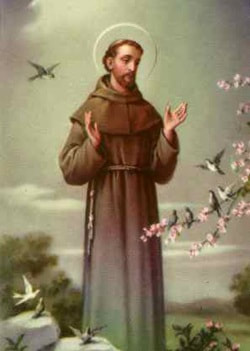 It certainly surprised me to find out that one of Christianity's most popular saints never actually said this, nor did he write the "Make me an instrument of Your peace" prayer! While these often-used quotes are very much in the spirit of St. Francis, the sentiment was likely inspired by a line from the Franciscan Rule, in which he said, "Let all the brothers, however, preach by their deeds." We all know St. Francis as the saint of simplicity, of appreciation for God's creation, and, of course, preaching to the birds. He was known in his lifetime as a man of great poverty, giving up all that he owned for the poor. In fact, as a young man, he stripped off his clothes in the middle of Assisi and renounced all worldly possessions, including his inheritance from his father. From that point on, Francis spent his life in service to the Gospel and God's people, spreading the message of Christ by the way he lived his life and interacted with others. It comes as no surprise, then, that our current Pope, a Jesuit, made a nod to this charism of simplicity and authenticity in choosing the name of Francis. It is, I believe, a stark reminder to the Church universal of exactly what the New Evangelization is all about: encountering Christ in our everyday lives and bringing Him to the world in the simplest ways possible. There is no better delivery of the Gospel than to treat every person we meet with simple Christian charity, as though he or she were Christ Himself. We are, after all, made in His very image and likeness! Two years ago while on pilgrimage to Rome, I had the great blessing of taking a day trip to Assisi. Many of us have heard the story of the San Damiano Cross, through which Francis heard the Lord say, "Rebuild my church, which as you see has fallen into ruin." Spending a day of prayer before that same cross, walking the hilly streets Francis traversed so many times in his life, and praying in the Porziuncola (the chapel Francis built with his own two hands), was like a step right into the life of the Saint. It inspired me in a very profound way to always remember that the goal of our faith is quite simple. If we live our lives with true authenticity to the Gospel, we rarely have need for words. Looking, then, to the example of Pope Francis and his namesake, today's Feast reminds us to live our faith simply, to find God in the simplicity of nature, the beauty of His creation, and in the face of each person we meet. It is how Christ lived his life, and how we are called to live ours. With that reminder, may we all be the instrument of His peace that our world so desperately needs us to be. Jay Schaefer is the Webinar Associate for the Catholic Apostolate Center.
The call to holiness and the mission presented to the Church from Jesus Christ is certainly a challenging one. The fact that God created us with the ability to freely choose not only between right and wrong but between varied truths allows the members of Christ’s body, the Church, to live out the freedom given by God by our birth and baptism. The Catechism defines freedom as “the power, rooted in reason and will, to act or not to act, to do this or that, and so to perform deliberate actions on one's own responsibility ... Human freedom is a force for growth and maturity in truth and goodness; it attains its perfection when directed toward God, our beatitude” (1731). The ‘mission,’ so to speak, of Catholics in this day and age is to live the Gospel message and to promote a New Evangelization.
This does not mean that everyone is called to any particular vocation. However, everyone is called to a vocation. It is up to the individual, because of their freedom, to choose and discern where they are being called by God and for what purpose. Thomas Merton, in his book New Seeds of Contemplation, eloquently puts it: Our vocation is not simply to be, but to work together with God in the creation of our own life, our own identity, our own destiny. We are free beings and sons of God. This means to say that we should not passively exist, but actively participate in His creative freedom, in our own lives, and in the lives of others, by choosing the truth. To put it better, we are even called to share with God the work of creating the truth of our identity. Concrete personal reflection has never come easy for me, and there is a reason that people tend to hide their emotions. Reflecting on the meaning of vocation and what God is calling me to do conjures up memories of high school retreats of discovering where God is found in daily life. While structured experiences of faith exploration and formation are important in shaping the broad spectrum of faith, I have learned that is not all of what my faith encompasses. At the very first meeting with my spiritual director, he asked, “Who is Alex?” I began to spew answers such as student, friend, brother, and the like. What I wanted to avoid was the internal reflection on the self because I didn’t want to have to address the underlying feelings regarding vocation and personal identity. If we are indeed called to shape our own identity, then we very often have a choice. This could be a choice between choosing the truth over a falsehood or even between particular vocations. In discernment, it is my task to look forward, to look to the future. If I dwell on the things of the past, I will never adequately be able to say that I have done what God is calling me to do, whatever it may be. It is the Christian’s responsibility, my responsibility, to discern this vocation, whatever it may be, under the guidance of the Holy Spirit. If we must seek the Creator “spontaneously,” as the Vatican II document Gaudium et Spes puts it, on their own accord and out of impulse, then it becomes clear that the mission of the baptized Christian is to seek God always and in all things. The Italian priest Saint Vincent Pallotti, patron of the Catholic Apostolate Center, wrote, “Seek God and you will find God. Seek God in all things, and you will find God in all things. Seek God always and you will always find God.” I have often found consolation in this prayer of Saint Vincent. It serves as a reminder to attune my heart and mind to God, in all things and at all times. Out of this freedom of choice and seeking comes a responsibility to act out of instinct and to lead others closer to Jesus Christ by first seeking the very God who created us. Alex R. Boucher is the Program & Operations Coordinator for the Catholic Apostolate Center. Follow Alex on Twitter at @AlexBoucher. |
Details
Archives
July 2024
Categories
All
|
About |
Media |
© COPYRIGHT 2024 | ALL RIGHTS RESERVED

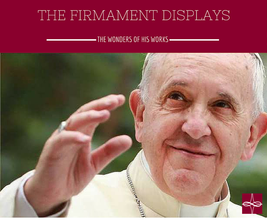

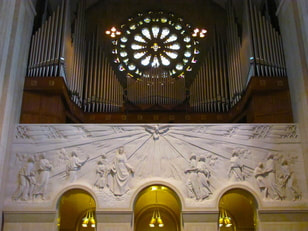
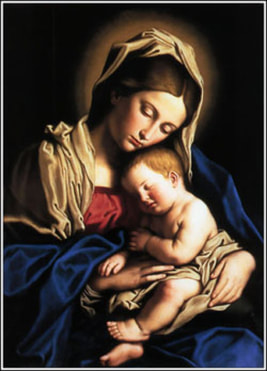
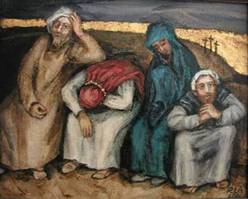


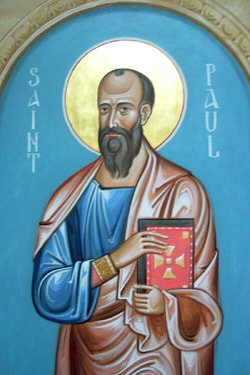
 RSS Feed
RSS Feed